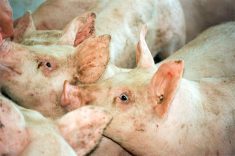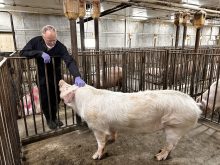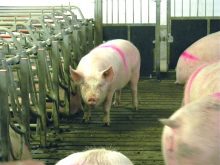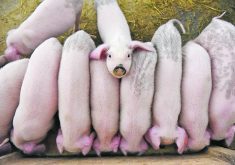Costly switch | Restaurant chains force move
Hog farmers hope that the move to open housing doesn’t put them out of business.
“If producers are not going to make money, they’re not going to stay in the business,” said leading Manitoba Hutterite hog production manager James Hofer of the Starlite Colony.
Hofer said some farmers have already built stall-free barns, but the vast majority of existing operations use stalls.
Hofer said retrofitting existing barns would cost millions of dollars per barn, so forced timelines could wreak havoc on the industry.
Read Also

Animal protection delivery to change in Saskatchewan
The Saskatchewan government is looking for a new agency to handle animal welfare after Animal Protection Services of Saskatchewan decided not to renew its contract next year.
Two major fast food chains and retail giant Safeway have announced policies or plans to avoid pork from gestation stall hog barn systems, while another said it was not pushing for a change.
On May 7, Safeway announced intentions to obtain a gestation stall-free pork supply chain. Burger King announced April 25 that it wants to purchase all of its pork from stall-free barns by 2017.
It also said it wanted its eggs and chicken meat from better-housed chickens.
And in early May, Tim Hortons called on the hog and poultry industries to move away from stalls and cages if they want to remain suppliers to the international food company.
“Tim Hortons today called upon the pork industry and our suppliers to eliminate gestation stalls for sows and to develop clear plans and timelines by the end of the year to phase out these housing systems,” said the company news release May 4.
The Tim Hortons position is similar to that of McDonald’s and Wendy’s, which have asked their suppliers to move away from stalls and cages and to outline how they plan to do it.
Domino’s Pizza, on the other hand, rejected a request from the Humane Society of the United States to call for an end to gestation stalls. Domino’s said it would continue to rely on the judgment of veterinarians and experts on humane treatment of animals when making its decisions.
Canadian Pork Council spokesperson Gary Stordy said the recent moves by some fast food chains to demand the end of stall systems is the result of pressure from animal rights activists rather than from evidence of animal mistreatment.
“This is really, essentially, activist lobbying and almost threatening some of the distributors or restaurant chains to do this or else,” said Stordy.
“The restaurants are in a tough position. It’s hard for them to take a stand.”
The Manitoba Pork Council announced before the recent wave of restaurant statements that it had set a goal of 2025 for stall-based systems to cease to operate in Manitoba. That is effectively a voluntary moratorium on building new sow barns because any new hog barn now needs to have at least a 20-year lifespan to justify the capital cost.
The CPC has not gone as far and does not have a direct position on whether farmers should build new stall-based sow barns.
Stordy said the industry, including veterinarians and experts in animal well-being and husbandry, are reviewing the existing code of practice and will probably address the sow stall issue when a draft revision is released this autumn.
Restaurant chains might feel they need to respond quickly to attacks on the gestation crate system, but producers need to be more careful.
“This s a serious issue that needs more than a knee-jerk reaction,”said Stordy.
Many veterinary authorities consider gestations stall systems to be humane, so pressure from animals rights activists shouldn’t be taken at face value, he said.















